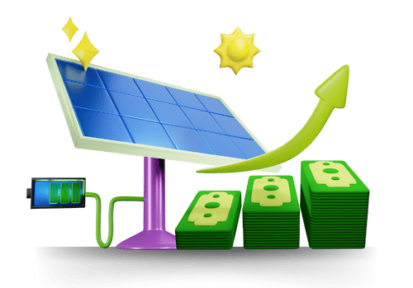For most Indian businesses, electricity is no longer a predictable monthly expense. It has become
Read MoreIn today’s competitive market, businesses are constantly seeking ways to cut the costs and increase their efficiency. One smart strategy that more and more businesses are adopting is investing in the solar power. Not only it reduces energy costs, but also offers a good amount of return on the investment.
Here’s why going solar power makes financial sense for businesses.
One of the most immediate financial benefits of going solar is the reduction in energy costs. With solar power, businesses can generate their own electricity, lowering their reliance on traditional energy providers and protecting themselves from rising energy prices.


A key factor in any business decision is ROI, and commercial solar installation offers an attractive return on investment. With the continued drop in the cost of solar technology and improved efficiency, businesses are reaping financial rewards faster than ever before.
The government is actively encouraging the adoption of renewable energy through tax credits and other financial incentives. These incentives can significantly reduce the upfront cost of installing a solar system.
Many states and local governments offer rebates, grants, and tax credits to encourage businesses to invest in solar energy, making it even more financially viable.
With solar power, businesses can take control of their energy supply. This independence from the grid can result in both financial and operational advantages.
In addition to the financial benefits, switching to solar power can also improve your business’s image. In today’s market, customers are increasingly drawn to companies that prioritize sustainability and social responsibility.
As energy prices rise and environmental regulations become stricter, businesses that adopt solar power today are future-proofing their energy needs. By investing in solar now, businesses can lock in low energy rates for the long term and ensure they’re prepared for future changes in the energy market.
One concern businesses may have about solar installation is the upfront cost, but with various financing options available, going solar has never been more accessible.
Incorporating solar energy into your business strategy isn’t just an environmentally responsible or sustainable choice—it’s a smart financial decision. From reduced energy costs and increased property value to attractive solar tax incentives and the ability to attract eco-conscious customers, the financial benefits of solar power are clear.
With government-backed initiatives like the PM KUSUM Yojana, businesses now have even more support to make the switch. This scheme not only promotes clean energy adoption but also offers subsidies and financial assistance for setting up decentralized solar plants, making solar installation more affordable for commercial and industrial users.
By investing in solar today, businesses can enjoy a predictable, long-term source of energy, gain independence from rising energy costs, and improve their sustainability efforts. It’s not just about saving money—it’s about investing in your future.
For most Indian businesses, electricity is no longer a predictable monthly expense. It has become
Read MoreWinters expose every weakness in a rooftop solar system — moisture, fog, temperature swings, metal
Read MoreAs India accelerates its path toward clean and sustainable green energy, the role of Solar
Read MoreIndia’s energy sector is transforming rapidly, and commercial rooftop solar has emerged as a core
Read MoreIntroduction: Why BIPV Is Gaining Traction in India (2026 Update)Cities are growing taller, streets are
Read More